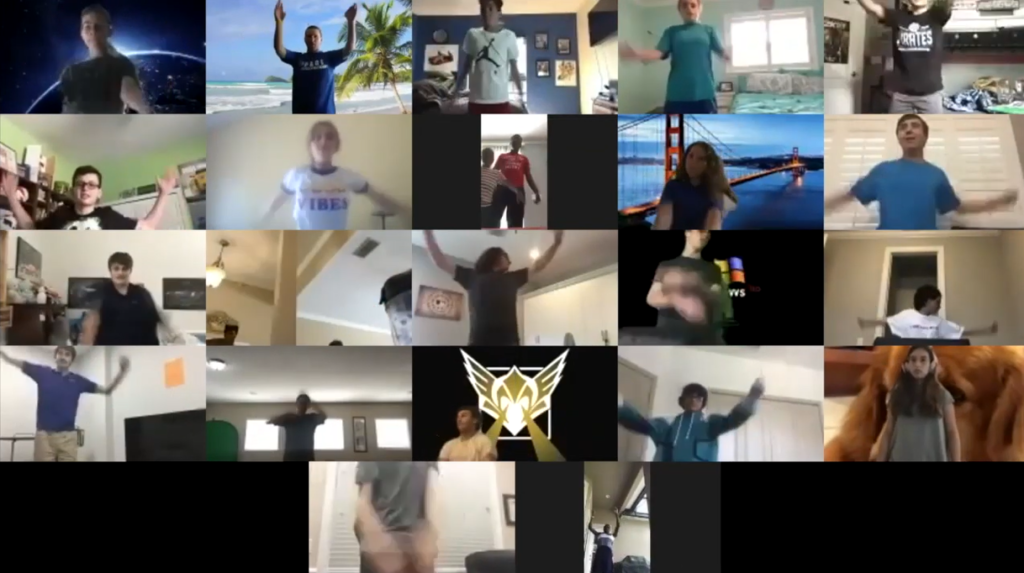
When teachers at a central Florida private school that strives to celebrate the uniqueness of each student learned they had only a few days to transition to remote learning, they vowed to get creative.
Really creative.
A math teacher devised a lesson plan using groceries from her pantry to show her students the difference between a polyhedral and a non-polyhedral. A physical education teacher designed a jumping jacks routine. A science teacher began mapping out a virtual tour of her farm.
Meanwhile, a social studies teacher laid out all the steps he takes to check the oil in his family’s Honda Accord.
While many schools throughout the state and the nation are recording lessons for students to access on demand, Pace Brantley School in Longwood is delivering online learning as if it’s a regular school day – and doing it with a healthy dose of imagination. The media team compiled a video to show the myriad ways teachers have come together to serve their students while staying within the bounds of social distancing.
“The kids are seeing their academic teachers as if they were still here on a block schedule,” said head of school Pam Tapley. “We take attendance. Two guidance counselors are monitoring. We just have a lot of great people supporting the classroom.”
Founded in 1972 with 10 students and two teachers, Pace Brantley specializes in educating students from kindergarten through high school with special needs, including attention deficit hyperactivity disorder, autism spectrum disorder and other challenges that affect learning. The school serves 165 students, 47 of whom participate in the Gardiner Scholarship program for children with unique abilities. One student attends on a Florida Tax Credit Scholarship, which along with the Gardiner program is administered by Step Up For Students, which hosts this blog.
Despite advice from some education experts who have encouraged simplification of schedules during coronavirus-induced distance learning, staff at Pace Brantley decided to stick with a structured day because they know it’s what works best for their students. Parents were encouraged at the outset to set up a workspace for their children dedicated to their virtual school day. Students start the morning by reciting the Pledge of Allegiance followed by the school pledge, promising to treat everyone with fairness, kindness and respect, just as they did when they were reporting to their 9-acre campus.
The first half of each 90-minute period includes live lessons on Zoom. Students spend the second half working independently or in small groups. They also get one-on-one access to their teachers if they have questions.
“I’m getting overwhelming emails from parents,” Tapley said. “Our kids thrive on having their schedule.”
One of those parents is Ann Zanca, whose son, Ben, attends Pace Brantley on a Gardiner Scholarship. Born with CLOVES Syndrome, a rare disorder characterized by tissue overgrowth and complex vascular anomalies, he is susceptible to respiratory issues, which puts him at higher risk for Covid-19 complications.
“When they started shutting down the school, part of me, as the mom of a kid at risk, was happy,” Zanca said.
She reports that Ben hasn’t missed a beat since the transition, which is critical if the 17-year-old is to stay on his college prep track.
“He needs to have a reason to get up and take a shower in the morning,” Zanca said, adding that she’s been impressed with how quickly the school responded to delivering distance learning.
“They put a lot of thought into it and made it as much like school as possible,” she said. “I listen at his door, and he’s engaging, and he’s laughing and doing his work.”
Another Pace Brantley parent, Susan Sleboda, said the experience has been similar for her son, Ryan. The 18-year-old senior is class president and a lead anchor and editor on the school’s morning news show.
“They’ve done a stellar job at providing this online format where students are actually able to interact with their teachers,” Sleboda said.
She was unsure at first how Ryan, who is on the autism spectrum and didn’t speak until he was 7, would acclimate to the change. Sleboda said he has adapted well and was eager to work with his peers to produce a virtual news program.
“By Day 2, he was telling a student that he was filming in an area where he had too much light,” she said. “Every day I’ve seen him gaining confidence in the system.”
Ryan, who plans to study anthrozoology at Beacon College in Leesburg next year, said he and his classmates are making the best of the situation, finding it not that much different from how things operated at their brick-and-mortar school. Instead of showing a lesson on the white board, his teachers are sharing their screens. Instead of producing a scene from “The Little Mermaid” for a live production of the school’s Broadway Dinner Night, the crew will pivot to a virtual production.
“It feels really weird, but I’m going to get used to it,” Ryan said.
If head of school Tapley had any doubts about her students’ ability to rise to the occasion, those doubts disappeared this week.
She learned, via parent emails, that some of the students are getting up and putting on their school uniforms before taking their places at their online workstations.


